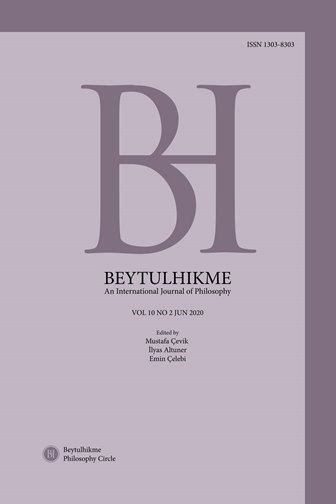Author :
Abstract
Makalenin amacı, yasal bilişi, değer-varoluşsal seviyesinin felsefi kanıtı ve normatif-teknik seviyenin eleştirisi, yani tanımlayıcı ve perspektif (değer) yönlerini seçme problemini anlamak yoluyla analiz etmektir. Belirtilen amaç, aşağıdaki görevleri tutarlı bir şekilde çözmektir: a) yasal bilişin antropolojik uygunluğunu araştırmak; b) bir avukatın bilişsel mesleki faaliyetinde değer yönelimlerinin ve tutumlarının atfedilmesini kanıtlamak; c) karar vermenin inisiyatif-bilişsel modelini karakterize etmek.
Keywords
Abstract
The objective of the article is to analyze legal cognition through the philosophical substantiation of its value-existential level and critique of the normative-technical level, namely, to understand the problem of choosing descriptive and perspective (value) directions. The purpose stated is to consistently solve the following tasks: a) to investigate the anthropological relevance of legal cognition; b) to substantiate the attribution of value orientations and attitudes in the cognitive professional activity of a lawyer; c) to characterize the initiative-cognitive model of decision-making.
Keywords
- Antonov, M. (2014). Theoretical Alternatives to the Systematization of Law: To the Logic of Normative Systems. Problems of Methodology and Philosophy of Law, 47-56.
- Bulygin, E. (2016). Selected Works on the Theory and Philosophy of Law. St. Peters- burg: Alef Press.
- Castells, M. (2016). The Power of Communication: А Monograph. Moscow: Higher School of Economics Publishing House.
- Chestakov, A. (2014). Cognition and Its Boundaries: Ontological, Epistemological and Metaphysical Aspects. Tver State University Vestnik, 2, 21-29.
- Chestnov, I. (2013). The Dialogical Concept of Law. Problems of Philosophy of Law, 160-193.
- Dzhejms, V. (2000). Pragmatism: A Monograph. Kyiv: Alternatives.
- Iatsenko, T. & Polianichko, O. & Pedchenko O. (2016). Methodology of Deep Perception of Human Consciousness. Social Sciences, 4, 121-127.
- Gadamer, H.-G. (1988). Truth and Method: Fundamentals of Philosophical Hermeneu- tics. Moscow: Progress.
- Khmil, V. (2018). Anthropological Component of the Nature of the State. An- thropological Measurements of Philosophical Research, 7, 7-15.
- Holmes, O. (2011). The Common Law: А Monograph. Toronto: University of Toron- to Law School Typographical Society.
- Huralenko, N. (2013). Judicial Jurisprudence: A Praxeological Dimension: A Mono- graph. Chernivtsi: Techno-Printing.
- Jaspers, K. (2009). Psychology of Worldviews. Kyiv: University.
- Kaufmann, A. (1990). Preliminary Remarks on a Legal Logic and Ontology of Relations. Law, Interpretation and Reality, 104-123.
- Kozlovsjkiy, V. (2016). Strason and Kant: Descriptive Metaphysics as a Concep- tual Precondition for the Analysis of the Critique of Pure Reason. Sententiae, 34, 25-41.
- Krawiets, W. (2009). Modern Society and Global Legal System as Normative Order of Primary Social Systems an Outline of a communication Theory of Law. Proto Sociology: An International Journal of Interdisciplinary Research, 26, 121-150.
- Nadurak, V. (2016). Emotions and Reasoning in Moral Decision Making. Anthro- pological Measurements of Philosophical Research, 13, 24-32.
- Perelman, C. (2000). Traite de l’Argumentation. La Novellе Rhetorique: Monographie. Bruxelles: Universite de Bruxelles.
- Rickert, G. (1997). The boundaries of science education concepts. St. Petersburg: Science.
- Schweidler, W. (2017). On the Sociocultural Body of Knowledge. Aspects of a Phenomenological Approach to the Social Philosophy of Science. Epistemology and Philosophy of Science, 51, 56-67.
- Skirtach, V. (2018). Transformations of the "subject" in the clinical discourse of philosophical anthropology. Anthropological Measurements of Philosophical Research, 13, 7-15.
- Stezhko, Z. & Stezhko, J. (2018). The Contradictions of Freedom and the Para- doxes of Responsibility: Anthropological Analysis. Anthropological Measurements of Philosophical Research, 13, 65-78.
- Stovba, A. (2015). Fate and Law: To Rethinking Legal Anthropology in the Con- text of a Non-Classical Philosophy of Law. Ethical and Anthropological Characteristics of Modern Law in a Situation of Methodological Pluralism, 86-92.
- Stratiy, Y. (2016). The Concept of Intellectual Knowledge from the Philosophical Perspectives of the Kiev-Mohyla Academy: Scholastic Context. Sententiae, 34, 179-194.
- Varga, Ch. (2009). The Nature of Law and Legal Thinking. Russian Yearbook of Theory of Law, 1, 343-356. Öz: Makalenin amacı, yasal bilişi, değer-varoluşsal seviyesinin felsefi kanıtı ve normatif-teknik seviyenin eleştirisi, yani tanımlayıcı ve perspektif (değer) yönlerini seçme problemini anlamak yoluyla analiz etmektir. Belirtilen amaç, aşağıdaki görevleri tutarlı bir şekilde çözmektir: a) yasal bilişin antropolojik uygunluğunu araştırmak; b) bir avukatın bilişsel mesleki faaliyetinde değer yönelimlerinin ve tutumlarının atfedilmesini kanıtlamak; c) karar vermenin inisiyatifbilişsel modelini karakterize etmek. Anahtar Kelimeler: Bilinç, değer yönelimleri, duygusal düzenlemeler, sorumluluk, biliş, yasal biliş.





